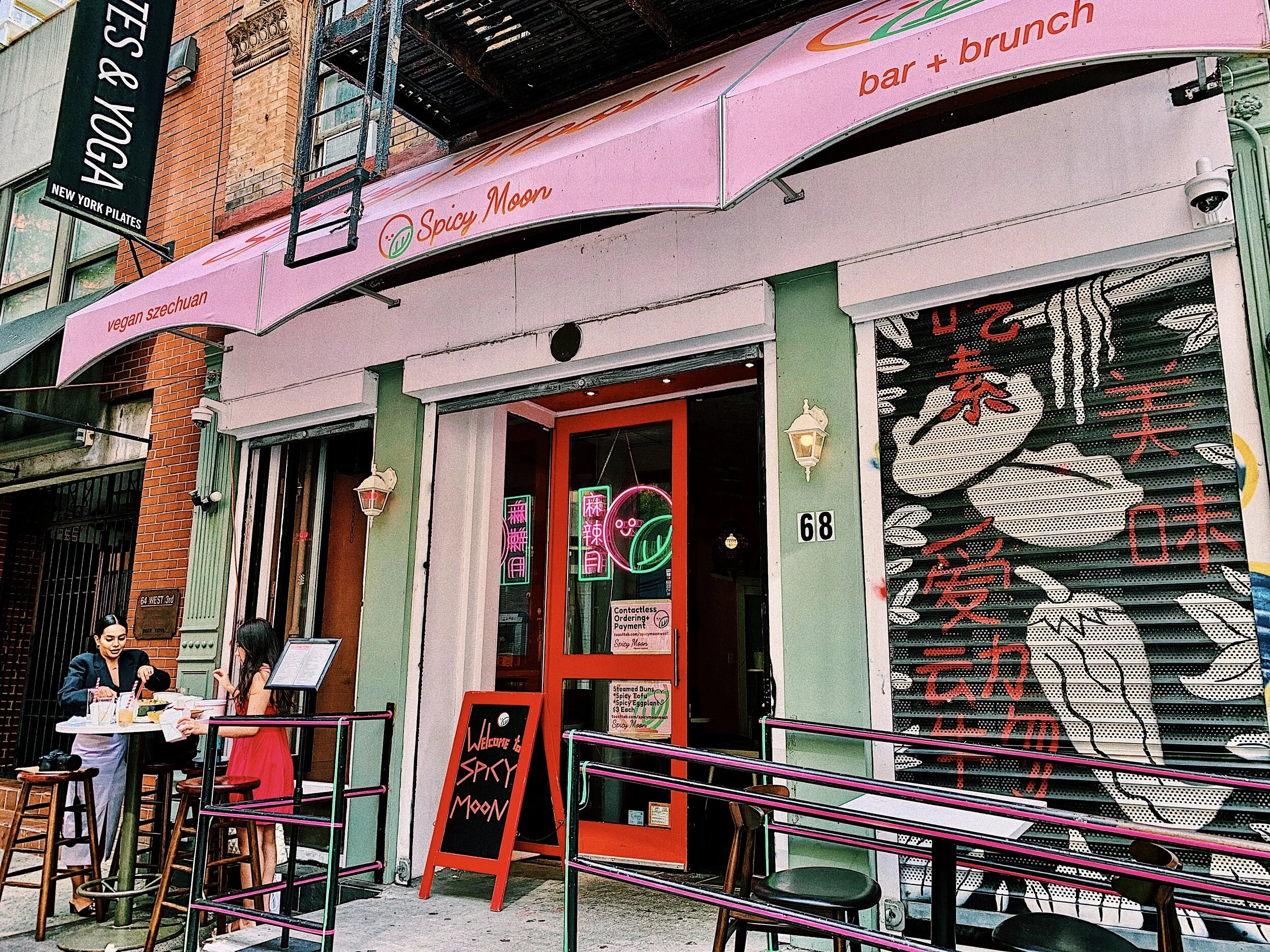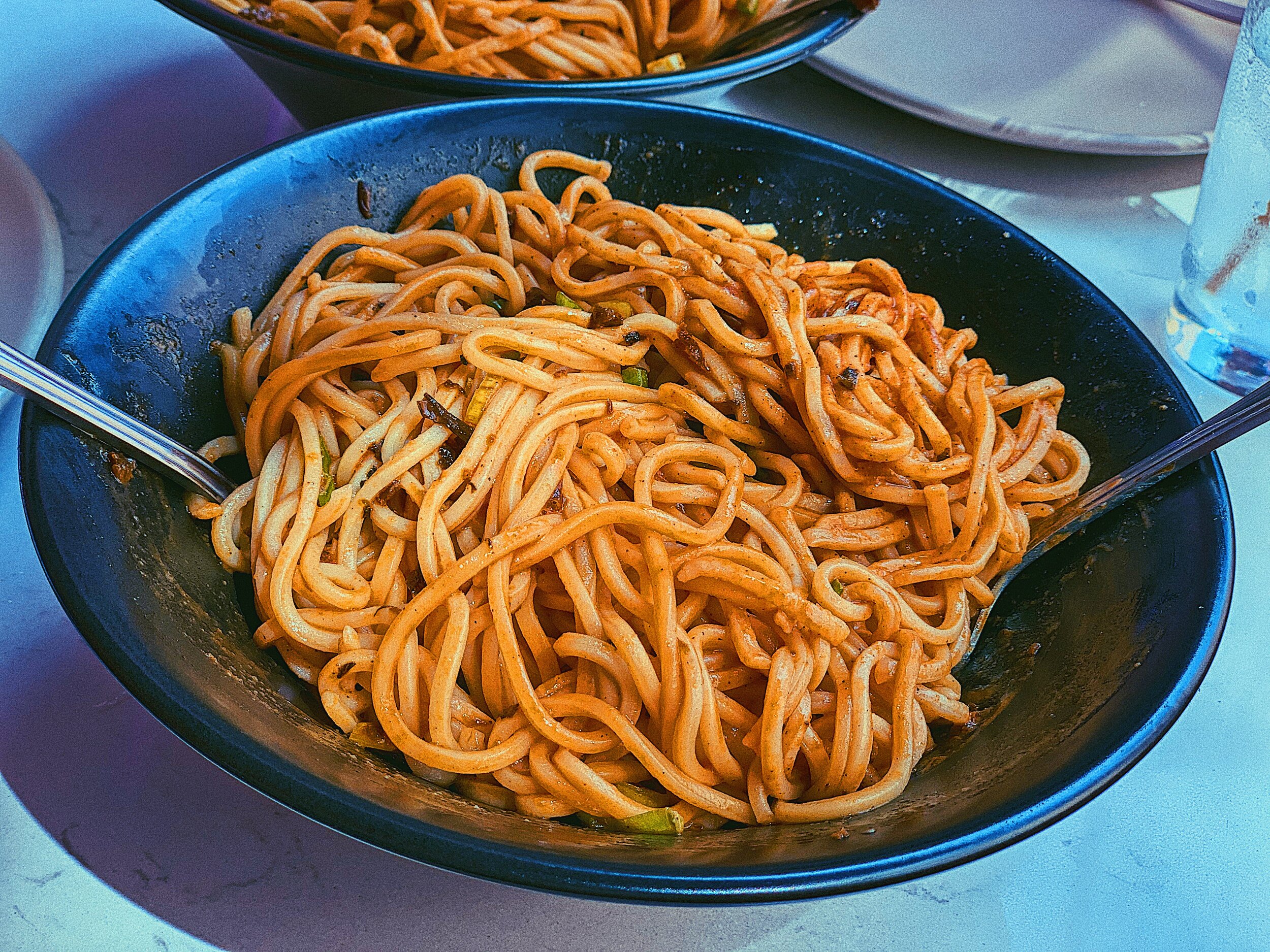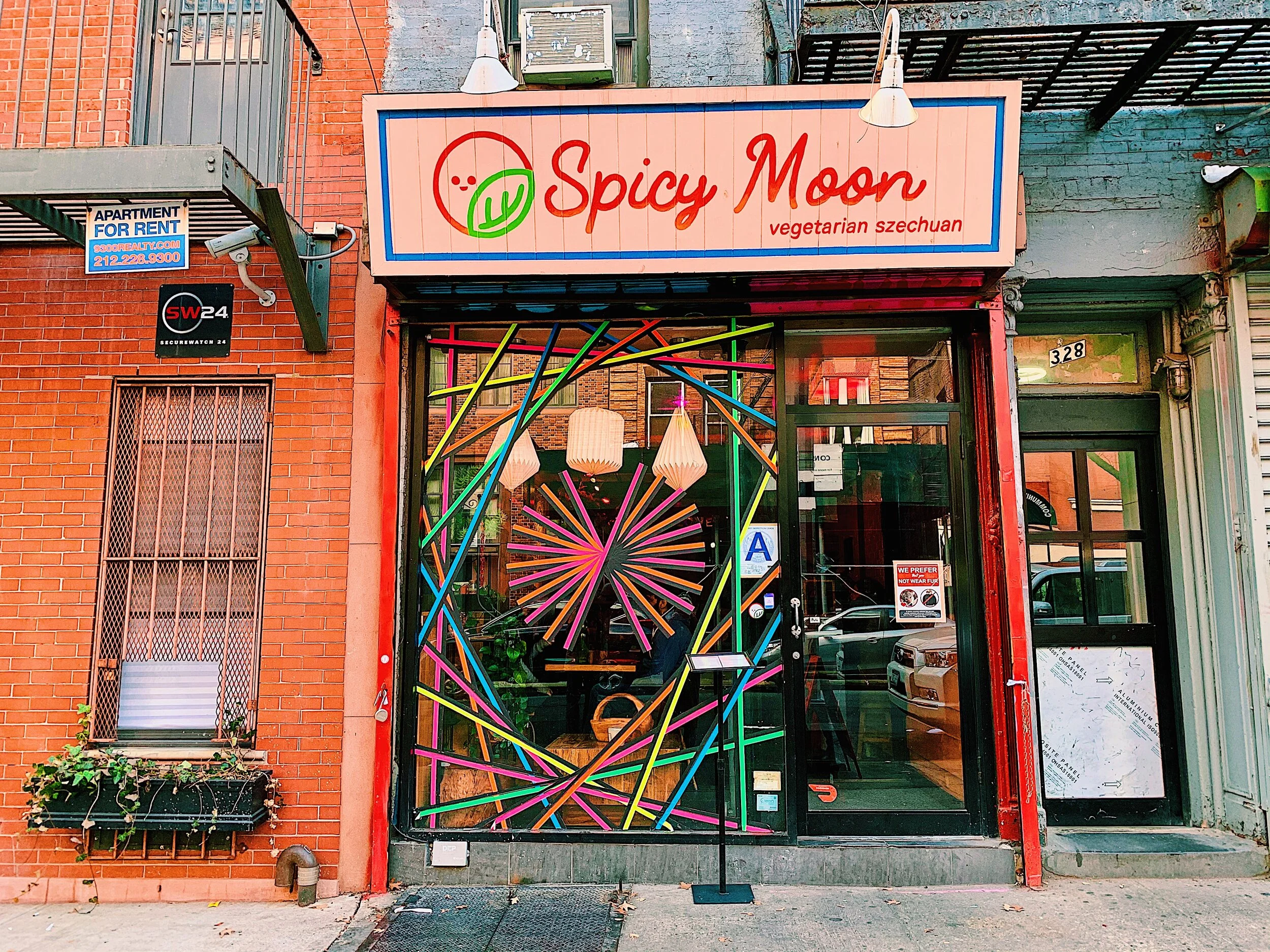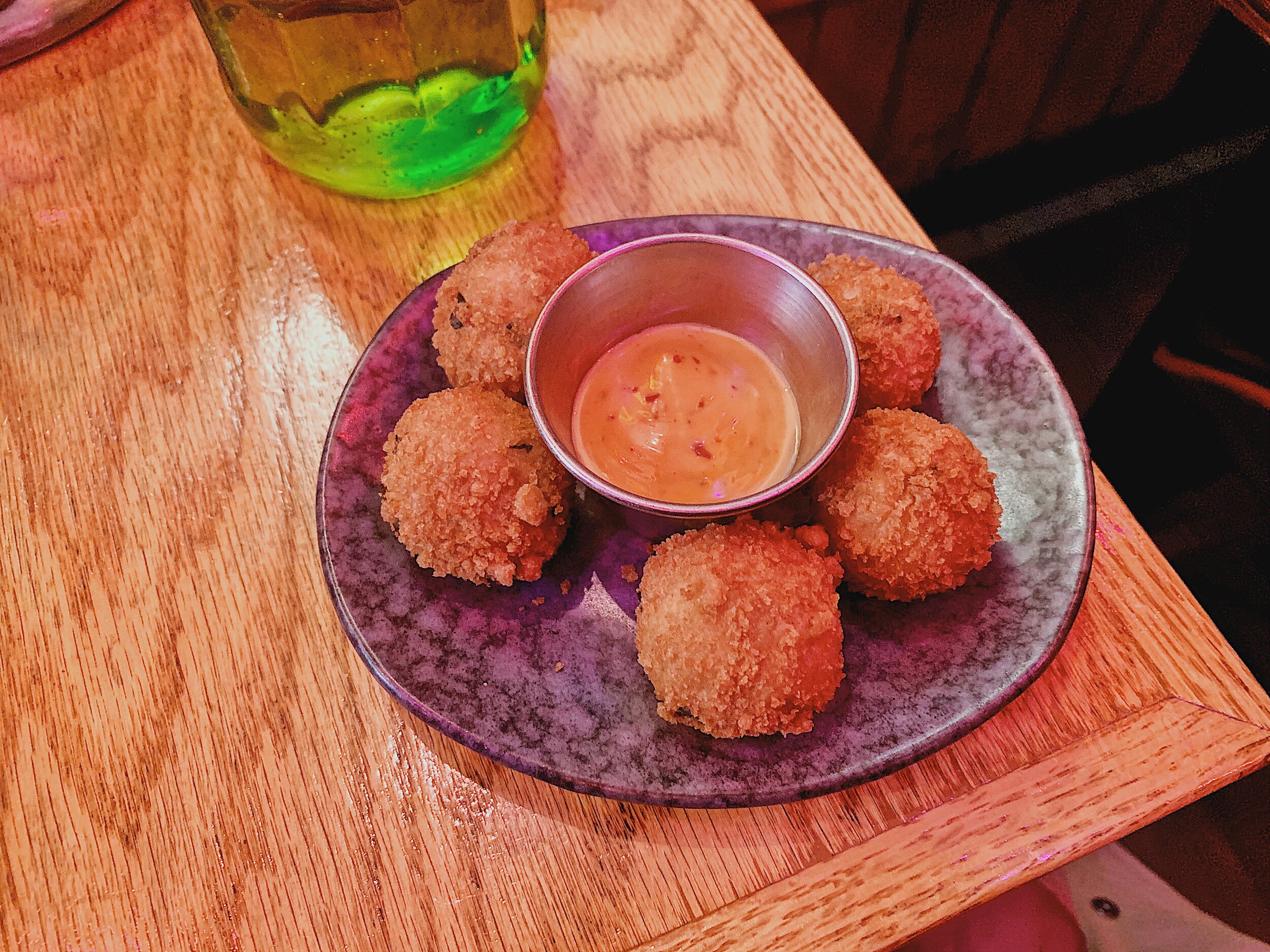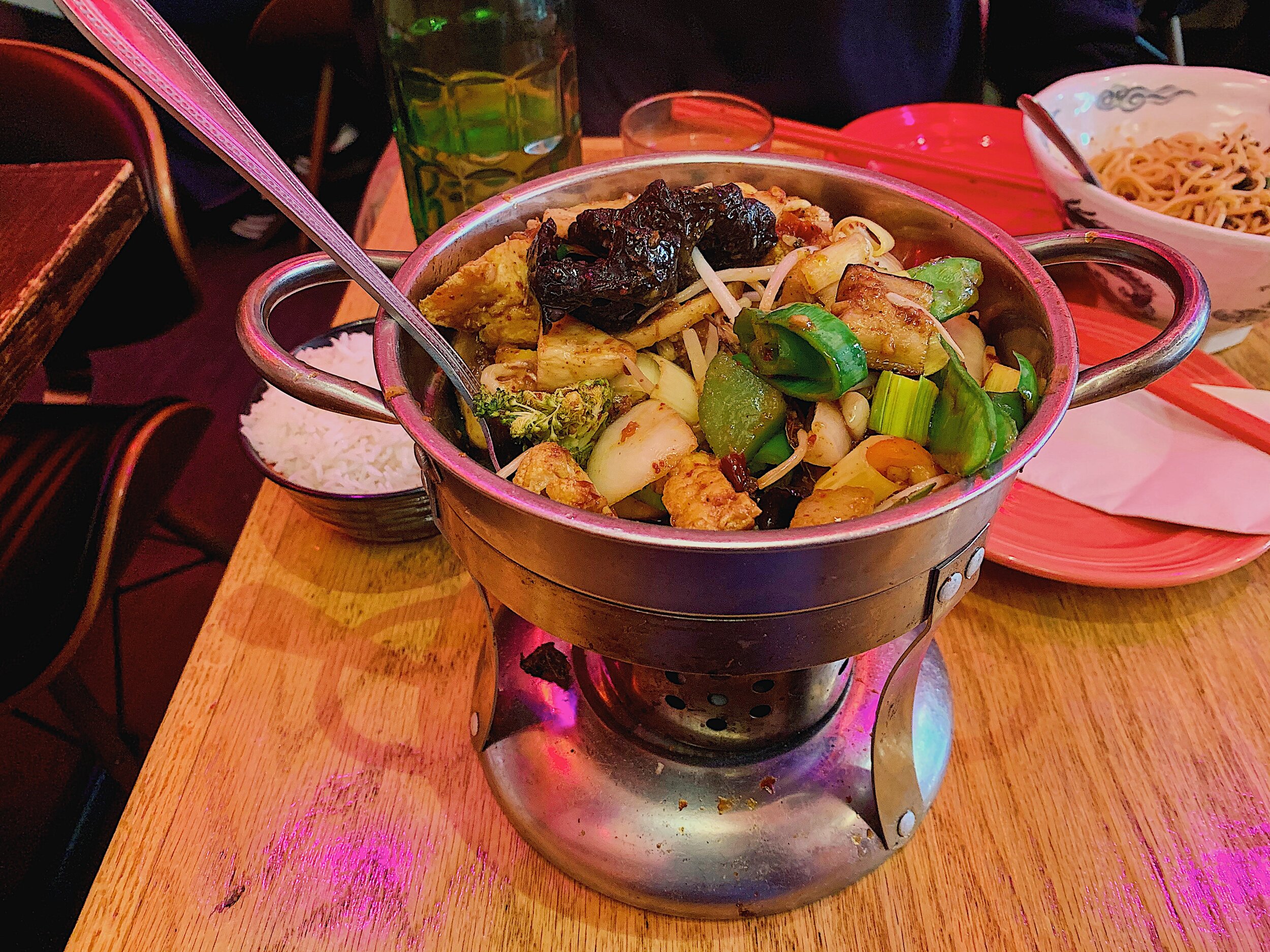Spicy Moon — Defining Hospitality Amidst Adversity
Spicy Moon’s new location in West Village
A few months ago, after I had published my first post about Spicy Moon, the chef / owner of the restaurant, Nick, messaged me on Instagram to tell me that he had enjoyed reading my post. This came as a complete shock to me, as I didn’t think anyone besides Patrick and a few of my coworkers were reading my blog, let alone the owners of the places that I was writing about. It was right around this time that I was thinking about starting my “COVID Anthologies” series, where I would tell the stories of extraordinary restaurants in this unordinary, new world. In my response to Nick, I decided to shoot my shot and ask if he would be willing to let me interview him for this series. To my delight, he agreed enthusiastically!
A few weeks later, I made my way down to Spicy Moon’s new West Village location for a weekend al fresco lunch and to meet Nick in person. I went with Patrick and one of our close friends and old roommates, Stu, who had never been to Spicy Moon before. We ordered our usual favorites (dan dan noodles, pea leaves with garlic) as well as a few new dishes. Of the new dishes that we tried, our favorite was the salt and pepper eggplant, which was piping hot, delicately crispy and packed full of umami. Ever since we tried that dish for the first time, Patrick and I have been ordering it every single time we get Spicy Moon. Unsurprisingly, Stu absolutely loved the food and agreed with me that Spicy Moon has the best dan dan noodles he’s ever had. Side note: Stu is allergic to both dairy and nuts, so the dan dan noodles at Spicy Moon were perfect for him because they are both dairy free (by default, since they are vegan) and nut free (they use sesame paste instead of peanut sauce).
After we finished eating, I sat down with Nick at a table outside and got my pen and notebook ready. Being the procrastinator that I am and a newbie to this whole interview thing, I had frantically come up with a rough outline of the questions I wanted to ask Nick while on the subway ride to Spicy Moon. I was super nervous in the moments leading up to the interview but, luckily, Nick is a very friendly person, and our conversation flowed naturally without much effort on my part.
Salt & pepper eggplant ($17.95)
The Early Days
Nick opened Spicy Moon with his wife, who became vegan after finishing college in Chengdu and immigrating to the US. Nick and his wife met while they were both working in a traditional Sichuan restaurant in NYC. Back then, most Chinese restaurants either didn’t understand veganism or didn’t have respect for true veganism. To this day, most Chinese restaurants cook vegetables in the same pots, sauces, and oils that they use to cook meat. Oftentimes, veggies are fried in lard, and homemade chili oil is sometimes made using animal fat. When vegans frequent these restaurants, they are often just told, “This dish is vegan,” even if there are animal ingredients present. Most of the time, this isn’t because of any desire to deceive but, rather, the result of a genuine lack of understanding of what veganism entails. In the minds of many Chinese restaurant owners and employees, vegan simply means any vegetable dish, regardless of the ingredients used.
Due to this dynamic, Nick’s wife would always bring her own food into the restaurant for meals rather than eat the dishes made at the restaurant where they both worked. When she floated the idea of starting a vegan Sichuan restaurant with Nick, Nick thought she was crazy. What dishes would they make? Who would come? How would they get Sichuan chefs who were willing to cook vegan? After all, in Chinese culture, and particularly in Sichuan culture, meat is associated with health, wealth and prosperity. In a sense, eating meat is seen as a prerequisite for sustaining life. Unless you are a Buddhist monk, vegetarianism and veganism are extremely rare in China due to the overwhelmingly connotations associated with a carnivorous diet. However, Nick eventually gave in and together, he and his wife opened their first location in East Village.
Dan dan noodles ($12.95)
As you can probably imagine, opening a vegan Sichuan restaurant came with a host of challenges. For one, adapting traditional Sichuan recipes to utilize solely vegan ingredients took a ton of work. Everything— from the types of seasoning to the ratios of the ingredients— had to be adjusted, as veggies have a different absorption rate than meat. However, after much trial and error, Nick and his wife were able to recreate some of the most beloved Sichuan dishes such as dan dan noodles and wontons in chili oil, without sacrificing taste or tradition. In additional to serving up a host of traditional Sichuan dishes such as double cooked beyond sausage and mápó tofu, Nick has taken advantage of the creative freedom that operating his own restaurant has afforded him and has created a few Chinese fusion dishes, such as mountain yam (known as shānyào in Chinese) vegan cheese puffs, Sichuan guacamole, “honey” walnut edamame nuggets and peppercorn brussels sprouts. Brussels sprouts are very rare in Asian cuisine, but are very trendy in the U.S., so Nick wanted to create a dish that highlighted flavors of Sichuan cuisine while taking advantage of trendy ingredients.
To Nick’s surprise, people loved Spicy Moon! Most restaurants bleed cash the first two years and grow slowly, but Spicy Moon started gaining good momentum after only six to eight months. Most of this momentum was driven by word-of-mouth and by the NYC influencer community, which Nick has a very good relationship with. Fun fact: I actually first heard about Spicy Moon from an influencer named Crystal Pang who goes by the Instagram handle @veganeatsnyc.
Fried vegetable dumplings ($9.95)
Demonstrating Hospitality during COVID-19
Over time, Nick and his wife started coming up with more and more menu items, and Spicy Moon blossomed in popularity. In February 2020, a few weeks before the state-mandated restaurant closures, they opened their second location in the West Village. Unfortunately, by the time the pandemic was tearing through NYC in full force, they were already locked into their lease and had no alternative but to continue operating as much as the city would allow. Eventually, they were forced to close down both locations towards the end of March and weren’t able to reopen until the end of May.
“It was horrible, and we had no other choice,” Nick stated as he recalled the first few weeks of the shut-downs. He paused, leaned back in his chair, and told me, “When we were signing our lease in the fall last year, we went to a Chinese fortune teller. She warned us that this was coming. She told us that the first half of 2020 would be full of bad luck, since the year of the rat signifies the start of a new Chinese zodiac cycle, but that things would improve in the second half of the year. I don’t usually believe in fortune telling and all this zodiac stuff, but I find it interesting that, so far, things have been playing out exactly as she had predicted.”
Málà wet jerky strips ($8.95)
However, despite the seemingly insurmountable challenge that the pandemic had presented, Nick and his wife found ways to continue serving their community. For 10 weeks while the restaurant was closed, the couple donated over 1,000 meals to people in need and frontline workers by partnering with community organizations. One notable organization that Spicy Moon partnered with is Chilis on Wheels, a non-profit that aims to make veganism accessible to all by providing hot, vegan meals to individuals and families in need. In addition to cooking and packaging ready-to-eat meals, Spicy Moon also donated fresh produce to local agencies and pantries in order to support their meal preparation efforts.
When I asked Nick why he participated in all these food donation programs, he told me that, in his view, food donation should be a requirement for restaurants, as the essence of any foodservice business is hospitality. “When you think of hospitality,” Nick pondered, “you think of the weary traveler knocking at your front door in search of warm food and shelter.” His eyes wandered off into the distance. “To me, that’s what you’re signing up for when you open a restaurant. By hanging up the “open” sign, you promise to never turn anyone away and to be a provider of warmth and comfort in times of need.” I sat in silence for a few moments while jotting this down. Wow, what a powerful image. No wonder why Nick greeted me like family when I first walked up to Spicy Moon, despite never having met me before.
Chive and JUST Egg dumplings ($11.95)
Challenges and Legacy
As Nick reflected on how far Spicy Moon has come over the years, he concluded that their biggest challenge, aside from COVID, has been finding and retaining Chinese chefs who are willing to cook vegan Chinese food. Most Chinese chefs in NYC are on the older side and are very loyal to traditional methods of Chinese cooking (this is especially true of Sichuanese chefs). As a result, they tend to have a difficult time accepting changes to recipes that they grew up with. There were a few Chinese chefs who straight up quit because they felt uncomfortable working in Spicy Moon’s all-vegan kitchen. Although there are many younger vegan Asian chefs out there these days (for example, I follow a young, Taiwanese chef who’s an undergrad at UC Berkeley and goes by the handle @chez.jorge on Instagram)— especially in vegan-friendly countries like Taiwan and Singapore— there aren’t that many in NYC, and it’s difficult to attract the few who do live in the city.
Towards the end of our chat, I asked Nick one final question: 50 years from now, when people think about Spicy Moon (crossing my fingers that it will still be around then), what do you want them to remember? Without hesitation, Nick replied, “Our fair labor practices and how much we valued our customers.”
Fair labor practices are an interesting point. The restaurant industry in American is notorious for underpaying workers and other questionable labor practices, such as refusing to grant overtime. In fact, the entire tradition of tipping in the United States has a troubling history and arose from a desire to pay workers the bare minimum in order to maximize profits. In some places, foodservice workers live entirely off tips and are forced to take on multiple jobs in order to even begin making a living(1). At Spicy Moon, Nick and his wife have made it their mission to ensure that all of their employees are able to make a living wage and readily offer overtime opportunities to their chefs. After all, hospitality runs in the couples’ blood, and how can you claim to be a business in the hospitality industry if you don’t treat your employees with kindness?
As I was leaving, I remarked to Nick that the funky neon tape decorating both Spicy Moon locations was an interesting touch. “Ah yes,” Nick explained as he pressed down the corner of a piece of tape that had begun peeling due to sun exposure, “This was done by a local tape artist. He comes back to change up the designs once in a while.” I don’t know why, but the thought of a local artist beautifying a local business made me smile (I later found out that the name of the artist is Kuki Gomez). I lingered for a second more to take in vibrant colors of the tape, the cute neon sign that spells out Spicy Moon in Chinese (Málà Yuè), and the black and white mural next to the entrance before telling Nick that I would be back soon.
Notes:
It is important to note that, in many instances, the restaurant owners themselves are not the only ones at fault, as they need to achieve certain profit margins in order to keep the restaurant open at all. This is especially true of mom-and-pop shops. Oftentimes, there are a multitude of external factors, from unfavorable laws to sky-high third-party fees, that make it difficult to operate a restaurant profitably.
Spicy Moon — Shattering the Oxymoron of “Vegan Chinese Food” while Celebrating Sichuan Cuisine
First visit: February 2020
Price: Affordable
Cuisine: Chinese, Sichuan
Vibe: Eclectic, hip, cozy
Address: 328 E 6th St, New York, NY (East Village)
Veg options: Everything is vegan!
COVID-19 delivery: Yes!
The eclectic storefront in East Village
“Vegan Chinese food” is an oxymoron. “Vegan Sichuanese food” sounds like a typo. Since I was born in Chongqing, which was part of the Sichuan province until 1997, I grew up on a predominantly carnivorous diet. All of my favorite hometown dishes, including huíguō ròu (twice-cooked pork), yúxiāng ròusī (literally translates to fish-flavored shredded pork, but is essentially shredded pork in garlic sauce) and làzǐjī (commonly known as Chongqing chicken in American restaurants) were meat-based. Even vegetable dishes, such as stir-fried bok choy and wok-tossed string beans, were frequently enhanced with minced pork or leftover chicken broth. My parents and grandparents, who grew up in poverty during the Cultural Revolution with limited access to animal products, hammered into me the belief that eating meat at every meal was the key to a long, healthy life. “Aiya, look at wài pó,” my grandma would always lament, “bad health today because meat too expensive when me and wàigōng were young.” I was raised to believe that meat is to health the same way that the sun is to light and oxygen is to life. In my mind, vegetarian food was reserved for monks and angsty, rebellious teenagers, with no place in the life of the average person.
My aunt’s homemade yúxiāng ròusī
Eventually, after educating myself and reading countless books and articles on the merits of a plant-forward diet, I came to the conclusion that “everything in moderation” is probably the right mantra to follow, and that incorporating more plant-based foods into my diet would probably do me some good. As much as I loved (and still love) meat, I loved my body more, and I was prepared to sacrifice a steak or two if it meant waking up feeling better every day and leading a healthier, more balanced life. Thus, I decided to begin eating more plant-based meals and to significantly decrease my consumption of animal products. I don’t want to get into a debate about whether eating meat is actually bad for you, but I think we can all agree that eating more fruits and veggies is something your doctor wouldn’t frown upon. Plus, eating plants is better for the environment than eating meat, which to me was the convincing cherry on top of an already compelling sundae. PSA: As I’ve stated in my bio, I am not vegan nor am I vegetarian. Your girl’s just trying to do better for herself and eat her greens.
To be honest, adopting a plant-forward diet has been much easier than I thought it would be. Most restaurants will let you sub out animal-based ingredients for plant-based alternatives such as tofu, beans or mushroom. Being Chinese, I grew up eating tofu pretty regularly (shoutout to mápó dòufu and dòuhuā(1), both Chongqing specialities) , so it wasn’t really a huge step to start replacing animal products with soy and other plant-based products. This was the easiest to do at health-conscious, fast-casual chains (e.g. Sweetgreen, Cava, Dig Inn, etc.), where you can simply omit meat and cheese from your salad or superfood bowl, followed by Thai restaurants, where fried tofu can easily take the place of animal protein in pad thai or pad see ew without significantly altering the flavor profile of the dishes, and the most difficult to do at authentic Chinese restaurants, where the meat itself is often memorialized in the name of the dish (think: twice-cooked pork, peking duck), and substituting chicken for tofu in your kung pao chicken (yes, contrary to popular belief, kung pao chicken, known as gōng bào jī in my province, is an authentic Sichuanese food) would almost certainly get you a death glare from the auntie refilling your lukewarm water(2).
Some dòuhuā that we had when we were in Chongqing
That’s why I was so excited when I learned that there was a 100% vegan Sichuan restaurant in the city that was actually good! I first heard about Spicy Moon from a NYC-based vegan influencer who goes by the handle @veganeatsNYC on Instagram. To my surprise, even a few of my carnivorous friends had been there before and had genuinely enjoyed the food. That was more than enough to convince me to drag Patrick and my lazy ass down to East Village on a dreary Sunday morning in the dead of winter.
As we approached the restaurant, my eyes were immediately drawn to the neon appliques that made up the psychedelic, web-like pattern on the store’s floor-to-ceiling window. My first thought upon seeing this was: “there’s no way this place is authentic! It’s trying way too hard to be another one of those edgy but underwhelming East Village eateries”. As I opened the door, I was shocked to see how small the restaurant was. There were a total of 25 - 30 seats crammed closely together in a long, rectangular space no larger than our tiny studio apartment. This was quite surprising, as I’m used to frequenting cavernous Chinese restaurants built to accommodate hundreds of guests, most of them multigenerational families, directed by the uniformed wait staff to squeeze around round tables topped with red tablecloths and lazy Susans. Spicy Moon is definitely a more intimate restaurant -- good for dates and small get-togethers, but not for annual family reunions. It was a good thing that Patrick and I had made a Yelp reservation in advance, or else we likely would have had to wait for a table.
The small but cozy interior
As soon as we entered the restaurant, we were immediately greeted by the staff and directed to a table for two towards the back (thank goodness because it was cold as f*ck that day). After we had settled in, our waitress brought over a glass pitcher full of room temperature water and gave us a few minutes to peruse the menu. The menu was printed double-sided on a 4” x 5” sheet of disposable paper and was accompanied by a pencil that you’re supposed to use to check off the dishes that you want to order. After a typical period of indecisiveness and me trying to convince Patrick that we needed to try everything on the menu because my eyes are bigger than my stomach, we decided to go with the mountain yam puff appetizer, followed by dan dan noodles, snow pea leaves with garlic and a tofu dry pot with jasmine rice.
After we handed our order slip to our waitress, I left the table for a hot second to use the bathroom, and the food was already on the table by the time I got back. At that point, Patrick had already previewed the dan dan noodles and informed me that they were possibly the best Chinese-style dry noodles that he’s ever had outside of China (when we were in China last summer, we ate noods every day and had zero regrets). With my hopes elevated and stomach screaming from hanger, I immediately stuffed some noodles into my mouth before Patrick could finish the entire bowl, and I was not the least bit disappointed.
The glorious dan dan noodles ($9.95)
These dan dan freakin’ noodles were 100% the best dan dan noodles I’ve ever had— even without the additional brownie points that they get for being vegan! The noodles themselves had the perfect amount of firm chewiness (believe it or not, it’s a herculean feat to be able to find noodles with a QQ(2) texture outside of Asia; they’re more often than not sad and soggy), and the sesame-based sauce was deliciously fragrant and juuust spicy enough to provide a pleasant kick without sending you running for tissues and milk. A lot of so-called dan dan noodles that I’ve had in the States taste one-dimensional, with sesame paste and store-bought chili oil being the only identifiable ingredients. Spicy Moon’s version, on the other hand, was complex: I could taste the sesame and chili oil, but I could also taste garlic, vinegar and the Sichuan peppercorns that gave the dish its quintessential málà flavor. The best part is that Spicy Moon was somehow able to deliver an authentic tasting Sichuan noodle dish without the pool of excess oil that typically sits waiting for you at the bottom of most Chinese noodle dishes. My only regret with this dish is that we didn’t order more.
The rest of our dishes were all very delightful, albeit nothing could measure up to the elite status of the dan dan noodles. The mountain yam puffs were essentially fried potato balls that came with a side of vegan queso. Not “authentic” in the traditional sense, but delicious nevertheless. The stir-fried snow pea leaves (my favorite vegetable!) were cooked just right, and the tofu dry pot had just the right amount of málà spice. I’ll be honest though, maybe it’s because I’ve had phenomenal lamb and beef dry pots that have made me biased towards meat-based versions of the dish, but the tofu dry pot didn’t blow me away. Next time, I would try a different tofu dish; perhaps the mápó tofu or the cumin style tofu. (Note: After I had initially written this review, I ordered the mápó tofu for delivery at the start of the COVID-19 outbreak. I don’t want to exaggerate, but it was definitely one of the best mápó tofus I’ve ever had. Even Patrick liked it, and he doesn’t usually like tofu! The sauce was spicy and wasn’t too numbing like a lot of mápó tofu dishes are, and the tofu was super soft and had a delicate, silken texture. It was definitely super oily, I’ll admit, but the flavors of the oil paired perfectly with the jasmine rice that came with the dish.)
Mountain yam puffs with vegan cheese ($6.95)
Snow pea leaves with garlic ($9.95)
Tofu dry pot ($15.95)
One interesting thing I noticed is that I didn’t feel nearly as bloated as I usually do coming out of a Chinese restaurant. Maybe it was because I felt good about myself since my meal was comprised entirely of greens and grains, or maybe it was because the magical dan dan noodles had cast a spell on me. Whatever it was, I definitely felt lighter and healthier than I had ever felt after a carb-heavy Asian meal. TL;DR, if you typically avoid going to Chinese restaurants because you hate that uncomfortable, greasy feeling that you get in your gut afterwards, fear not. Spicy Moon will leave you feeling satiated without putting you in a food coma.
Tips:
Make a Yelp reservation if you can, especially if you have a group of three or more.
Get the dan dan noodles. Just do it!!
The prices can add up if you order a bunch of appetizers, but you could easily make this an affordable meal by just getting a bowl of noodles. The dan dan noodles that Patrick and I shared would probably have been enough for one person.
In summary:
Hangry Alice rating: 5/5
Must get dishes: Dan dan noodles, mápó tofu
Skip: None— everything tastes great!
Notes:
Dòuhuā translates literally to bean flower, but the dish itself is essentially a tofu pudding that is typically eaten with chili oil and rice in my province.
In China, warm or room temperature water is the preferred way of drinking water, as it is commonly believed that cold water upsets the body’s natural chemistry and can cause indigestion and cramping.
According to the Michelin Guide, QQ is the bounciness associated with fresh handmade fish balls, glutinous rice balls, and certain types of noodles. The term originated from Taiwan, where Q sounds similar to the local word for “chewy”, but it’s evolved to mean a little more than that. The Asian version of al-dente, QQ foods are soft but not mushy - they must offer some resistance to the bite. Read more here.

